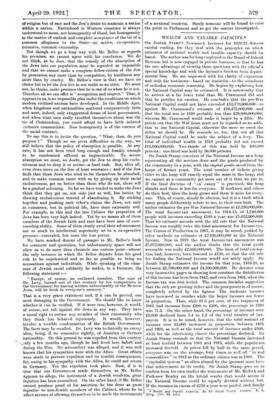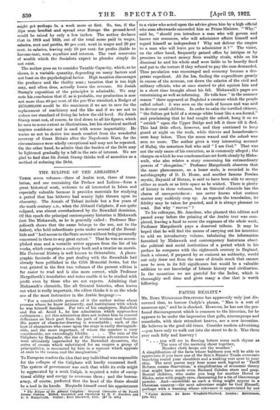WEALTH AND TAXABLE CAPACITY.•
Stu Jonas STAMP'S Newmarch Lectures for 1920-21 deserve careful reading, for they deal with the principles on which estimates of national wealth and taxable capacity should be based. The author was for long employed in the Board of Inland Revenue but is now engaged in private business, so that he has the rare advantage of viewing these questions with the official's special knowledge and with the layman's freedom from depart- mental bias. We are impressed with his clarity of exposition and with his testimony—based on statistics—to the soundness of orthodox economic reasoning. He begins by explaining how the National Capital may be estimated. It is noteworthy that he arrives at a far lower total than Mr. Crammond did and that he justifies his caution. He concludes that the pre-War National Capital could not have exceeded- £15,179,000,000—as against Mr. Crammond's estimate of £16,472,000,000—and that the total was in 1920 probably less than £20,000,000,000, whereas Mr. Crammond would make it larger by a fifth. He points out that the Wei. Loan must not be regarded as an addi- tion to our National Capital, otherwise the more we owed the richer we should be. He reminds us, too, that not all this National Capital could be made the subject of a levy. The total of individual wealth in 1919 probably did not exceed £15,000,000,000. Two-thirds of this was held by 400,000 persons ; one-third was held by 36,000 persons.
Sir Josiah Stamp conceives of the National Income as a heap representing all the services done and the goods produced by the community in a year, with the capital goods saved from the heaps of former years. The total number of tickets giving titles to the heap will exactly equal the mass in the heap, and we cannot as a community get more out of it than we put in. If the fatal doctrine of " ea' canny " is practised, the heap shrinks and there is less for everyone. If workmen and others do their best, then the heap grows and there is more for every- one. This, of course, should be obvious, but it is a truth which many people deliberately refuse to see, to their own hurt. The author estimates the pre-War National Income at £2,250,000,000. The total Income-tax assessment, for 1914-15, of 1,240,000 people with incomes exceeding £160 a year was £1,022,000,000. Thus his estimate accords with the old rule that the. National Income was roughly twice the total assessment for Income-tax. The Census of Production in 1907, it may be noted, yielded by other methods an estimate of £2,030,000,000 as the National Income. Now in 1919 the total Income-tax assessment was £2,072,000,000, and the author thinks that the total profit assessable was really £2,400,000,000. The limit of total exemp- tion had, however, been lowered to £130, so that the old rule for finding the National Income would not safely apply. Sir Josiah Stamp estimates the income for that year, 1919-20, as between £3,700,000,000 and £4,100,000,000. He devotes some very instructive pages to showing bow constant the distribution of this income has been from 1842, and even from 1801, when the Income-tax was first levied. The common Socialist suggestion that the rich are growing richer and the poor poorer is, of course, completely refuted by the figures. The moderate incomes have increased in number while the larger incomes are fewer in proportion. Thus, while 61.5 per cent. of the taxpayers of 1801 had incomes from £200 to £500, the percentage in 1920 was 71.3. On the other hand, the percentage of incomes over £5,000 declined from 1.4 to 1.3 of the total number of tax- payers. It is to be noted, however, that the total amount of incomes over £5,000 increased in proportion between 1801 and 1920, as well as the total amount of incomes under £500, while for the intervening classes the percentage declined. Sir Josiah Stamp reminds us that the National Income increased at least tenfold between 1801 and 1913, while the population increased fivefold. As prices fell by half in the same period, everyone was, on the average, four times as well off " in real commodities " in 1913 as the ordinary citizen was in 1801. The " capitalist system " so often abused by the ignorant must have that achievement to its credit. Sir Josiah Stamp goes on to confirm from his own studies the statements of Mr. Mallock and Professor Bowleg on the trivial results that would accrue if the National Income could be equally divided without loss. If the incomes in excess of £250 a year were pooled, each family • WiTalt18 and Taxable Cavacilit. Dr Sir Josiah Stamp. Landon 5, 1105. 6d. net.i might -get !perhaps 5s. a week more at first. 'So, too, if 'the Alps -were -levelled -and spread over Europe the ground-level would be raised by only a -few inches. The author declares that in 1919 and 1920, out of the total sums paid in wages, salaries, rent and profits, 60 per cent. went in wages and 20 per oent. in salaries, leaving only 20 per cent. for profits (liable to Income-tax), rent, royalties and interest. The vast reservoirs of wealth which the Socialists expect to plunder simply do net exist.
The author goes on to consider Taxable Capacity, which, as he shows, is a variable quantity, depending on many factors and not least on the psychological factor. High taxation discourages the producer and the thrifty man ; taxation that is too high may, -and often does, actually lessen the revenue. Sir Josiah Stamp's exposition of the principles is admirable. We may note his eonclusion 'that if, as is probable, our production is now not more than 80 per cent. of the pm-War standard, a Budget of £870,000,000 would be the maximum if we are to save for the replacement of machinery and the like and if we are not to reduce our standard of living far below the old level. Sir Josiah Stamp must -not, of course, be tied down to all his figures, which he uses to some extent as illustrations, bet his statistical method inspires confidence and is used with serene impartiality. He warns us mot to derive too much comfort from the wonderful recovery of •Great Britain after the Napoleonic Wars, for the circumstances were wholly exceptional and may not be repeated. On the other hand, he admits that the burden of the Debt may be lightened gradually by a fall in the rate of interest. We are glad 'to find that Sir Josiah Stamp thinks well of annuities as a method of reducing the Debt.



































 Previous page
Previous page